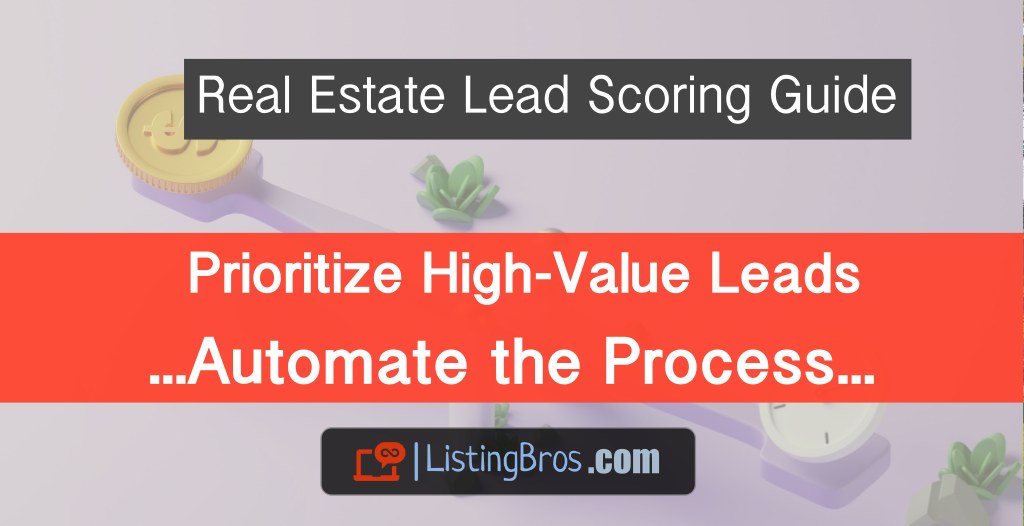Real Estate Lead Scoring System: Prioritize High-Value Leads

Lead scoring is a crucial component of a real estate lead generation system, helping prioritize and focus efforts on leads that are more likely to convert into clients or customers. Here's a step-by-step guide on implementing lead scoring in a real estate context:
1. Define Your Ideal Lead:
- Identify the characteristics of an ideal lead. Consider factors such as location, budget, property type, and any specific requirements.
- Our Suggestions: One of the enjoyable and crucial things we do with our clients is crafting a profile of their perfect customers, also known as avatars. We recommend you do the same for yourself. The key features to focus on are the budget, prequalification status, and the timeframe for purchasing a house. These aspects play a vital role in defining your ideal customers.
2. Gather Data:
- Collect data from various sources like website forms, social media, and third-party lead generation platforms. This data may include contact information, property preferences, and any other relevant details.
- Our Suggestions: A simple way to attract potential clients is through advertising campaigns and various social media posts, like video tours with voiceovers, flyers, and more on different platforms. However, creating these engaging listing presentations can be time-consuming and may need multiple skills. That's why we recommend using ListingBros advertisement software. It helps you effortlessly create captivating marketing videos for your listings, complete with polished voiceover narration for a truly professional touch. (Click Here to learn more about our advertisement software)
3. Lead Segmentation:
- Categorize leads into segments based on their level of interest, engagement, and demographic information. Common segments may include first-time homebuyers, sellers, investors, etc.
4. Define Scoring Criteria:
- Establish a scoring system with both positive and negative attributes. Assign scores based on factors such as:
- Property preferences matching your listings.
- Engagement with your website or social media.
- Budget range.
- Location preferences.
- Responsiveness to communication.
- Previous interactions with your agency.
- Our Suggestions: We've discovered that a great way to spot high-scoring leads is by checking if they're open to answering some follow-up questions. These might include finding out if they're prequalified and when they plan to buy a house. This helps us understand how interested and prepared they are for the home-buying journey. Plus, we make things easier with automated follow-up text messages through our CRM system. (Learn more about our system!)
5. Assign Point Values:
- Assign numerical values to each criterion based on its importance. For example, a lead filling out a contact form might get fewer points than a lead attending an open house.
6. Monitor Lead Behavior:
- Use analytics tools to track lead behavior. Monitor website visits, email opens, and any other interactions. Adjust scores based on real-time engagement.
- Our Suggestions: A great way to stay connected and share information with your leads or customers is through email campaigns (i.e. list of new listings email, in a specific price range). If a lead regularly opens your emails and takes actions like clicking on links, it's a positive sign to boost their score. This shows they are actively engaged and interested in what you're sharing.
7. Lead Scoring Tiers:
- Establish scoring tiers (e.g., cold, warm, hot) to quickly identify the potential of each lead. Customize these tiers based on your specific criteria and the scores assigned.
- Our Suggestions: Building a funnel is a top-notch method we employ to take care of real estate leads for our clients. When we get leads from social media ads, we store them in the "Warm Leads" section. Through our automated lead nurturing system, we move them up to the appointments list. Unfortunately, not all leads automatically make it to the appointments tier, and some might end up in the "Cold Leads" tier which will decrease the lead score.
8. Automate the Process:
- Implement a CRM (Customer Relationship Management) system with automation capabilities to streamline the lead scoring process. Automation can help in assigning scores, updating lead statuses, and triggering notifications.
- Our Suggestions:
Automation plays a key role in lead scoring because handling hundreds of leads from ads manually would be impossible. We strongly suggest setting up a complete marketing system instead of relying on separate tools (Learn More).
11. Prioritize High-Scoring Leads:
- Focus your marketing and sales efforts on leads with higher scores. These are more likely to convert and should be prioritized in your outreach efforts.
13. Evaluate and Refine:
- Regularly assess the effectiveness of your lead scoring system. Analyze conversion rates and make adjustments as needed to improve accuracy.
Implementing a lead scoring system in your real estate lead generation strategy can significantly improve efficiency, allowing you to focus your resources on leads with the highest potential for conversion. Regular monitoring and adjustments are essential for maintaining its effectiveness over time.
If you are looking to generate high-quality real estate leads, explore the ListingBros real estate marketing system today. Take the first step toward real estate success – click here to learn more and request a demo!
